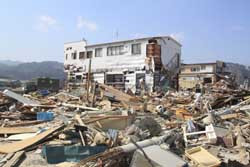Developing resilient communities
The cost of natural disasters was estimated at an alarming EUR 75 million in 2010, up from EUR 26 million only a year prior to that. It is evident that the means to quantify performance criteria for community resilience systems is necessary. In light of this, the EU-funded 'Integrated European disaster community resilience' (ICRED) project has proposed a framework that can be applied to different types of hazards and not only natural disasters. The demonstrations were focused primarily on earthquake hazards. Various spatial and temporal scales were taken into consideration that examined how resilience can be improved in both pre- and post-event contexts. The project successfully accomplished many of its main goals. Some of these included defining and quantifying a resilience framework and its dimensions, and developing a beta version of the software as well as a smart phone application. The team developed case studies as well as a prevention and mitigation strategy. ICRED has developed long-term collaboration at the international level and synergies have been created at the European level. Sharing project results with emergency authorities and organisations will advance the development of new resilient communities during extreme events, benefiting European society overall.







